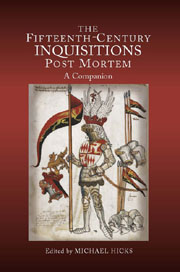Book contents
- Frontmatter
- Contents
- List of Tables and Figures
- List of Contributors
- Preface
- Glossary
- Abbreviations
- 1 Introduction
- 2 Crossing Generations: Dower, Jointure and Courtesy
- 3 The Lesser Landowners and the Inquisitions Post Mortem
- 4 Tales of Idiots, Signifying Something: Evidence of Process in the Inquisitions Post Mortem
- 5 The Value of Fifteenth-Century Inquisitions Post Mortem for Economic and Social History
- 6 ‘Notoriously Unreliable’: The Valuations and Extents
- 7 The Descriptions of Land Found in the Inquisitions Post Mortem and Feet of Fines: A Case Study of Berkshire
- 8 Re-assessing Josiah Russell's Measurements of Late Medieval Mortality using the Inquisitions Post Mortem
- 9 A Great Historical Enterprise: The Public Record Office and the Making of the Calendars of Inquisitions Post Mortem
- 10 Writs and the Inquisitions Post Mortem: How the Crown Managed the System
- 11 ‘Thrifty Men of the Country’? The Jurors and Their Role
- 12 Place-Names and Calendaring Practices
- Index
12 - Place-Names and Calendaring Practices
Published online by Cambridge University Press: 05 February 2013
- Frontmatter
- Contents
- List of Tables and Figures
- List of Contributors
- Preface
- Glossary
- Abbreviations
- 1 Introduction
- 2 Crossing Generations: Dower, Jointure and Courtesy
- 3 The Lesser Landowners and the Inquisitions Post Mortem
- 4 Tales of Idiots, Signifying Something: Evidence of Process in the Inquisitions Post Mortem
- 5 The Value of Fifteenth-Century Inquisitions Post Mortem for Economic and Social History
- 6 ‘Notoriously Unreliable’: The Valuations and Extents
- 7 The Descriptions of Land Found in the Inquisitions Post Mortem and Feet of Fines: A Case Study of Berkshire
- 8 Re-assessing Josiah Russell's Measurements of Late Medieval Mortality using the Inquisitions Post Mortem
- 9 A Great Historical Enterprise: The Public Record Office and the Making of the Calendars of Inquisitions Post Mortem
- 10 Writs and the Inquisitions Post Mortem: How the Crown Managed the System
- 11 ‘Thrifty Men of the Country’? The Jurors and Their Role
- 12 Place-Names and Calendaring Practices
- Index
Summary
This chapter is only indirectly about inquisitions post mortem. Since Roy Hunnisett published his two invaluable guides to calendaring, Indexing for Editors (1972) and Editing Records for Publication (1977), these inquisitions have been one of the classes of record on which major progress in calendaring has been achieved, culminating in the fine set of five volumes now added to the series. The author was asked to help with the identification of Cornish place-names in these volumes and so was able to make known to the editors his great reservations concerning the task which they were being asked to perform as regards placenames generally. As a result of this calendaring activity, it is in these records that Hunnisett's recommendations for the treatment of place-names have had their main effect, and therefore that the problems inherent in his policy have become evident. The other class of records where significant progress in calendaring has been made, the Elizabethan patent rolls, has followed different principles. It should be emphasised that the disagreement is with only one aspect of Hunnisett's recommendations, and it is a tribute to his work overall that it continues to provide essential guidance for anyone engaged in the challenging task of calendaring and indexing records for publication. Much of what Hunnisett recommended on personal names, and indeed some of what he recommended on place-names, remains sensible and useful. The timing of this minor contribution is uncomfortable, since it comes not long after Hunnisett's death in December 2009.
- Type
- Chapter
- Information
- The Fifteenth-Century Inquisitions 'Post Mortem'A Companion, pp. 223 - 238Publisher: Boydell & BrewerPrint publication year: 2012



